GPP Pushed Forward in China and Korea
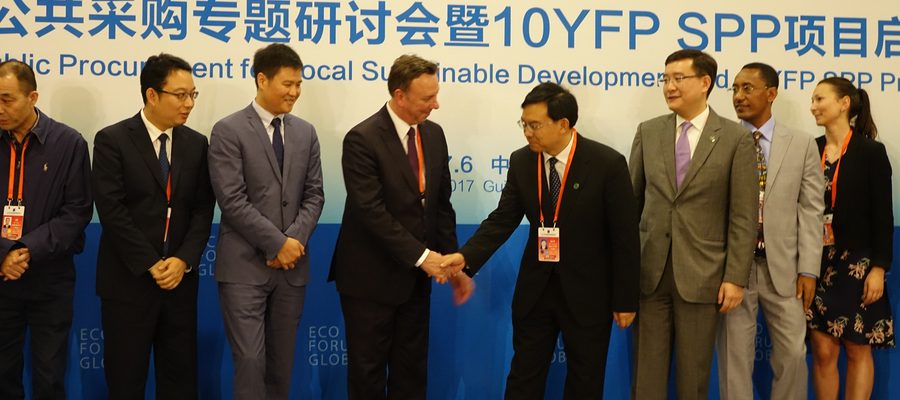
During the Eco Forum Global Guiyang Symposium 2017, ICLEI East Asia hosted the seminar on green public procurement in cooperation with the Eco Forum Global Secretariat and Guiyang Municipal People’s Government. On the occasion, ICLEI also officially announced the launch of the 10YFP on SPP (sustainable public procurement) 1a Working Group Project on GPP implementation and impact monitoring (10YFP on SPP project).
The 10 Year Framework Programme (10YFP) is a global framework of actions to accelerate the shift towards sustainable consumption and production through international cooperation. Under the 10YFP, this project is designed to support Chinese and Korean cities in enhancing green public procurement at the local level. ICLEI has been leading the project implementation in coordination with UN Environment and regional partners.
Oslo, a City of Leading Practice
Green public procurement (GPP) is regarded as a critical force in the transformation towards sustainable consumption and production. In the city of Oslo, green and innovation procurement policies have been set to meet various goals, including zero-emission, 50% eco-labeled food and beverages, waste reduction and recycling, etc.
Katja Khardikova, Coordinator Sustainable Public Procurement, City of Oslo, explained, “central steering documents, such as the Climate and Energy Strategy have also been politically adopted, aiming to integrate sustainability and social responsibility in the general procurement strategy.” In fact, a new procurement strategy is soon to be adopted in the city later this year.
According to Khardikova, Oslo’s current procurement strategy focuses on three areas, namely: transportation, resource efficiency, and building and construction management. The city is proud to have shared its experiences and acquired best practices from other places through its active engagement in the international platforms of Global Lead City Network on Sustainable Procurement (GLCN) and Procura+ led by ICLEI.
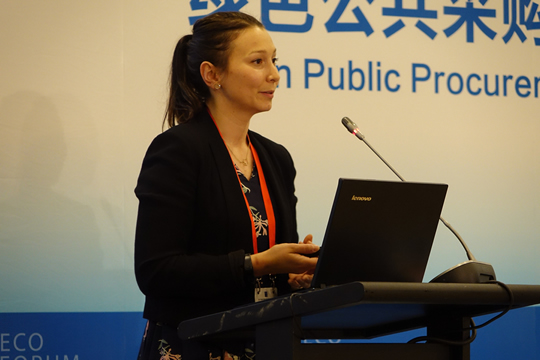
Katja Khardikova share Oslo’s experience on GPP implementation.
Korean Experience
During the seminar, Korea’s experience with GPP implementation received much attention. According to Minuk Choi, Officer of Environment Department, Suwon, Korea, it appears to have been efficient and effective to promote GPP through the awareness-raising and capacity building of city officers.
Despite all the challenges Suwon has faced, the city has managed to raise policy-makers awareness and has improved its GPP performance from 33.1% (2016) to 52.6% (as of June 2017) by providing capacity-building programs to heads of each department in the administration. In achieving better GGP performance, Suwon has already confirmed its participation in the 10YFP on SPP project.
Sanghoon Park, Researcher at Korea Environment Industry and Technology Institute (KEITI), added, that KEITI is also supporting governments of all levels to enhance GPP implementation through providing detailed green products information, guidelines, training, and financial incentives. Considering there are still spaces for Korean local governments to improve, KEITI is planning to develop a GPP performance evaluation system, awareness-raising programs, and pilot city projects to accelerate the shift towards green procurement in Korea.
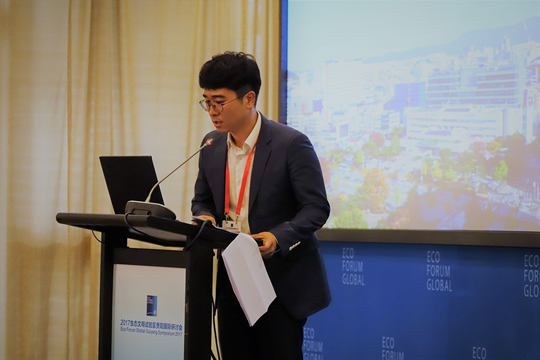 Minuk Choi explained the difficulties Suwon is facing regarding GPP. |
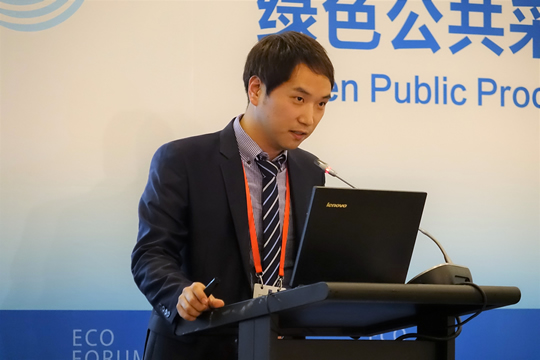 Sanghoon Park of KEITI. |
Chinese Cities Going Green
Yiqun Chen, Vice Director of the China Environmental United Certification Center (CEC), presented the general trend of GPP implementation in China. According to him, GPP in China is based on the list of eco-labeling certifications, which is updated annually and covers 59 categories of products, including IT, furniture, office equipment, electronic devices, and automobiles. In 2015, the GPP ratio has reached 81.5% among all eco-labeled products.
While the eco-labeling system has been helpful in presenting achievement and mobilizing wider participation in the shift towards a green market, Chen suggested that holistic research on the general GPP performance in China should be carried out and that more attention should also be given to human health and well-being.
The eco-civilization pilot city Guiyang has prioritized low carbon and energy-saving procurement. In order to improve transparency and efficiency, Chief Economist of the Financial Bureau, Guiyang Mei Han said, the city has compiled a list of green products and developed an online information center which includes a bidding process and documentation with a monitoring system.
Tianjin, with the support of the APEC Tianjin Green Supply Chain Service Center (TGCC), has developed various policies and issued lists of green procurement and green supply chain products for government procurement. In particular, Tianjin Binhai District has adopted a centralized implementation of GPP and is carefully following the list of government procurement of energy-saving products and eco-labeling.
“The district is carefully following the list of government procurement of energy-saving products and eco-labeling, which includes both mandatory and recommended purchases,” Dewen Cheng, Director of the Public Procurement Center, Tianjin Binhai District said, and in 2016, energy-saving and environmental protection products have made up to 88% in the district’s government procurement.
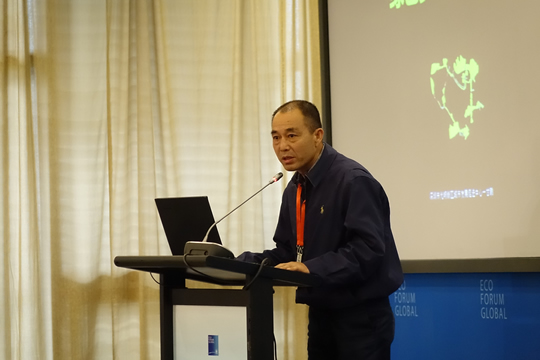
Peng Gan, Director of Urban Development Promotion Center of Shenzhen Guangming New Area
“The recently established Guangming new area strictly follows the values of green, low-carbon, and sustainable development,” said Peng Gan, Deputy Director of the Urban Development Promotion Center, Shenzhen Guangming New Area. With numerous projects on-going, the area has recognised GPP model an important tool for green development. The district has identified lights, transportation, solar equipment, and building as prioritized working areas, and is eager to achieve better performance through learning other cities’ practices and experience.
The China Environmental United Certification Center (CEC), is working to expand environmental criteria for GPP, covering areas such as GHG emission and waste management. According to Ling Ding, Director of Green Procurement Promotion Office, CEC, the Center is also supporting Dongguan, the pilot city for GPP and green supply chain management to reduce GHG emission and pollution.
Moving Forward: GPP in China and Korea
The seminar was concluded by the high level dialogue facilitated by Gino van Begin, Secretary General of ICLEI, where Desta Tesfaw Mebratu, Ethiopian Minister of State for the Prime Minister’s Office; Katja Khardikova, Coordinator Sustainable Public Procurement, City of Oslo; Cheng-liang Huang, Director of Theory Research Department, Ecological Civilization Research Think Tank, Chinese Academy of Social Sciences; and Yujing Zhou, Vice President and Head of HR, Philips China came together to share their opinions.
As one of the world’s leading manufacturing country, China has entered the stage of transformation towards innovation due to the excess capacity. Yujing Zhou, Vice President and Head of HR, Philips China, however, is optimistic about such development. She believes that the promotion and implementation of GPP would not only foster formation of new business models, but would also improve public awareness of the environment.
In addition to Suwon’s (Korea) confirmation on engagement, several Chinese cities have also revealed strong interest in joining the 10YFP on SPP project. ICLEI East Asia will soon finalize the confirmation of participation, and the project will be ready to put into practice.




